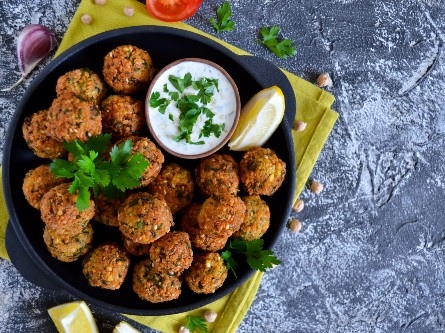
It’s no secret that the choices we make can affect our heart. This includes diet, physical activity, smoking and sleep patterns. Heart disease is the leading cause of death, according to the American Heart Association. Additionally, nearly 47% of American adults have high blood pressure, which increases their risk of a heart attack or stroke.
To help you prevent heart disease, UC Davis Health registered dietitian Margaret Junker, who specializes in cardiovascular nutrition, has some suggestions.
Here are seven things she likes to eat — and tips for what to avoid — for a healthy heart. (These points coincide with the 2025-2030 Dietary Guidelines for Americans.)
Read about 5 ways to keep your heart healthy and happy
1. Get plenty of fruits and vegetables.
Eat: My favorite are blueberries because they’re a great snack, either fresh or frozen. I also love how easy spinach is to use. You can use fresh spinach as a salad or quickly sauté with garlic and onions. A diet rich in fruits and vegetables is associated with a reduced risk of heart disease. Dried, fresh, frozen, or low sodium canned fruits and veggies all work.
Avoid: I avoid canned fruit in heavy syrup and any foods with high fructose corn syrup.
Try this recipe for a simple winter fruit salad
2. Choose foods made with mostly whole grains rather than refined grains.
Eat: My favorite grains to eat are quick oats and quinoa. Both are whole grain and easy to cook.
Avoid: I stay away from foods containing processed white flour because there are fewer nutrients and no fiber.
3. Choose healthy sources of protein.
Eat: There are some great options that are my go-tos in this category.
- Plant protein: I love to eat a serving of nuts daily. Walnuts and almonds are known for their omega 3 fatty acids. A quarter cup of nuts makes a great snack. Eating more nuts was associated with lower risk of heart disease, coronary artery disease, and stroke. Lentils are high in fiber, high in protein, easy to cook, and may cause less gastrointestinal (GI) discomfort than beans. A higher intake of legumes (beans and peas) is linked to lower heart disease risk.
- Fish and seafood: My favorites are salmon or seared ahi tuna because they are high in protein, have fewer calories and contain healthy heart Omega 3 fatty acids.
- Low-fat or fat-free dairy products: My favorite is non-fat Greek yogurt because of its versatility. It’s high in protein, has a lot of calcium, and can replace sour cream in many recipes. It’s a great breakfast option, stirred with quick oats and berries.
- Lean cuts of meat and poultry: Instead of processed meats, I often choose skinless chicken thighs. It’s leaner than most beef, affordable and has more flavor than chicken breast, which I get tired of.
Avoid: I avoid processed meats. What’s in it? It’s a mystery!
Explore the health benefits of cottage cheese vs. yogurt
4. Use liquid plant oils.
Eat: My favorite is avocado oil, which has a high smoke point at 520 degrees. I like to bake with walnut oil for added flavor. Liquid plant oils are rich in unsaturated fats, which reduce low-density lipoprotein (LDL) cholesterol and heart disease risk. These include oils from peanuts, most tree nuts, and flax seeds.
Avoid: I stay away from fats that are hard at room temperature, such as bacon grease, shortening and margarine. I also avoid tropical oils (coconut, palm, and palm kernel), animal fats (butter and lard), and partially hydrogenated fats. Occasionally, I use small amounts of coconut oil or butter to flavor specific recipes.
5. Limit drinking beverages and eating foods with added sugars.
Eat: I love using maple syrup in my coffee and oatmeal. I also sweeten with small amounts of local honey.
Avoid: I avoid any chemically based sweeteners and processed white sugar. Added sugars are associated with increased risk of type 2 diabetes, coronary heart disease and being overweight. Alternative sweeteners have shown mixed effects on metabolism.
Learn these healthy habits to help you prevent or manage your type 2 diabetes
6. Choose and prepare foods with little or no salt.
Eat: I use dried herb blends, fresh herbs, and citrus to elevate the natural taste of foods.
Avoid: I avoid salt (sodium) as much as I can. There is a direct relationship between increased salt intake and high blood pressure. In the U.S., the top sources of salt are packaged and processed foods and foods prepared outside the home.
Check out this guide to low sodium eating
7. Limit your alcohol intake.
Drink: Water with a splash of lemon or cucumber is a great option for some added flavor.
Avoid: If you don’t drink alcohol, don’t start. If you choose to drink alcohol, limit your intake. The risk of atrial fibrillation (A-fib) and stroke increases with higher alcohol intake. Stroke and coronary artery disease are lowest in those who drink 1-2 alcoholic beverages daily. The American Heart Association does not recommend drinking more alcohol to improve heart disease health.
See why it's important for you to drink water and stay hydrated
Read these 5 health benefits for cutting alcohol
Stay physically active
In addition to eating right, it’s important to be active to achieve and maintain a healthy body weight. You can find the right energy balance may by combining a healthy dietary pattern with at least 150 minutes of moderate physical activity per week.
Check out UC Davis Health's class for patients called "Let's Get Moving"
Proper eating is not just about cutting calories
Remember, nutrition is not about cutting calories to the point of hunger or eating saturated fat all day long, like the popular keto diet. Good nutrition is about eating delicious, fresh, whole plant-based foods that are in season. These foods provide the healing vitamins and minerals you need for a healthy and fully functional body and mind.
Learn about the keto diet and if it can help you
Learn more about nutrition and heart health at UC Davis Health
We look forward to partnering with you in your health care. If you are interested in working with a UC Davis Health registered dietitian, you can reach out to one of our primary care clinics.
There are also several nutrition and heart health classes you can take at UC Davis Health. Here are a few that are offered:




